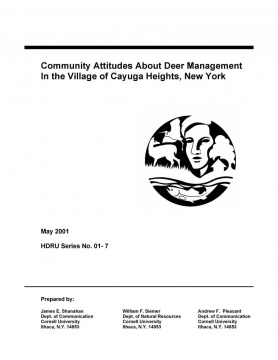In August of 1998, the Cayuga Heights Village Trustees and Mayor established a deer committee to examine the issue of deer in the village and make related recommendations to the village trustees. That committee worked closely with researchers from Cornell University, who completed studies of the deer population and village residents’ beliefs and attitudes toward deer and deer management methods in 1999.
The Cayuga Heights Deer Committee met regularly to explore the costs, social acceptability, biological feasibility, and regulatory constraints associated with several potential deer management actions. Their efforts included public meetings in October 1999 and January 2001.
Throughout this time, Cornell Cooperative Extension staff conducted an outreach program that provided information about deer and deer management. In 2000, Cornell Cooperative Extension initiated a study to measure changes in public attitudes towards deer based on new information extended to community residents via that extension education program. This study was developed to help Cornell Cooperative Extension staff learn more about the effects of their outreach activities related to deer management in Cayuga Heights.


